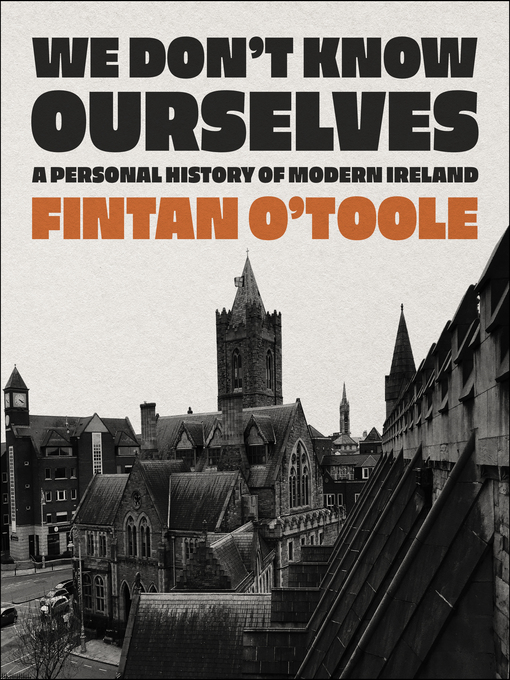We don't know ourselves A personal history of modern Ireland
Book - 2022
"A celebrated Irish writer's magisterial, brilliantly insightful chronicle of the wrenching transformations that dragged his homeland into the modern world. Fintan O'Toole was born in the year the revolution began. It was 1958, and the Irish government--in despair, because all the young people were leaving--opened the country to foreign investment and popular culture. So began a decades-long, ongoing experiment with Irish national identity. In We Don't Know Ourselves, O'Toole, one of the Anglophone world's most consummate stylists, weaves his own experiences into Irish social, cultural, and economic change, showing how Ireland, in just one lifetime, has gone from a reactionary "backwater" to an almost... totally open society--perhaps the most astonishing national transformation in modern history. Born to a working-class family in the Dublin suburbs, O'Toole served as an altar boy and attended a Christian Brothers school, much as his forebears did. He was enthralled by American Westerns suddenly appearing on Irish television, which were not that far from his own experience, given that Ireland's main export was beef and it was still not unknown for herds of cattle to clatter down Dublin's streets. Yet the Westerns were a sign of what was to come. O'Toole narrates the once unthinkable collapse of the all-powerful Catholic Church, brought down by scandal and by the activism of ordinary Irish, women in particular. He relates the horrific violence of the Troubles in Northern Ireland, which led most Irish to reject violent nationalism. In O'Toole's telling, America became a lodestar, from John F. Kennedy's 1963 visit, when the soon-to-be martyred American president was welcomed as a native son, to the emergence of the Irish technology sector in the late 1990s, driven by American corporations, which set Ireland on the path toward particular disaster during the 2008 financial crisis. A remarkably compassionate yet exacting observer, O'Toole in coruscating prose captures the peculiar Irish habit of "deliberate unknowing," which allowed myths of national greatness to persist even as the foundations were crumbling. Forty years in the making, We Don't Know Ourselves is a landmark work, a memoir and a national history that ultimately reveals how the two modes are entwined for all of us"--
- Subjects
- Published
-
New York, NY :
Liveright Publishing Corporation, a division of W. W. Norton & Company
2022.
- Language
- English
- Main Author
- Edition
- First American edition
- Physical Description
- 616 pages, 16 unnumbered pages of plates : illustrations ; 25 cm
- Bibliography
- Includes bibliographical references (pages 572-598) and index.
- ISBN
- 9781631496530
- Prelude The Loneliest Boy in the World
- Chapter 1. 1958: On Noah's Ark
- Chapter 2. 1959: Modern Family
- Chapter 3. 1960: Comanche Country
- Chapter 4. 1961: Balubaland
- Chapter 5. 1962: Cathode Ní Houlihan
- Chapter 6. 1963: The Dreamy Movement of the Stairs
- Chapter 7. 1962-1999: Silence and Smoothness
- Chapter 8. 1965: Our Boys
- Chapter 9. 1966: The GPO Trouser Suit
- Chapter 10. 1967: The Burial of Leopold Bloom
- Chapter 11. 1968: Requiem
- Chapter 12. 1969: Frozen Violence
- Chapter 13. 1970: The Killer Chord
- Chapter 14. 1971: Little Plum
- Chapter 15. 1972: Death of a Nationalist
- Chapter 16. 1973: Into Europe
- Chapter 17. 1976: The Walking Dead
- Chapter 18. 1975-1980: Class Acts
- Chapter 19. 1971-1983: Bungalow Bliss
- Chapter 20. 1979: Bona Fides
- Chapter 21. 1980-1981: No Blue Hills
- Chapter 22. 1980-1981: A Beggar on Horseback
- Chapter 23. 1979-1982: The Body Politic
- Chapter 24. 1981-1983: Foetal Attractions
- Chapter 25. 1982: Wonders Taken For Signs
- Chapter 26. 1984-1985: Dead Babies and Living Statues
- Chapter 27. 1987-1991: As Oil Is to Texas
- Chapter 28. 1986-1992: Internal Exiles
- Chapter 29. 1989: Freaks
- Chapter 30. 1985-1992: Conduct Unbecoming
- Chapter 31. 1990-1992: Mature Recollection
- Chapter 32. 1992: Not So Bad Myself
- Chapter 33. 1992-1994: Meanwhile Back at the Ranch
- Chapter 34. 1993: True Confessions
- Chapter 35. 1993-1994: Angel Paper
- Chapter 36. 1998: The Uses of Uncertainty
- Chapter 37. 1990-2015: America at Home
- Chapter 38. 1990-2000: Unsuitables from a Distance
- Chapter 39. 1999: The Cruelty Man
- Chapter 40. 1997-2008: The Makeover
- Chapter 41. 2000-2008: Tropical Ireland
- Chapter 42. 2009-2013: Jesus Fucking Hell and God
- Chapter 43. 2018- : Negative Capability
- Acknowledgements
- Notes
- Credits
- Index
Review by Library Journal Review
Review by Kirkus Book Review

